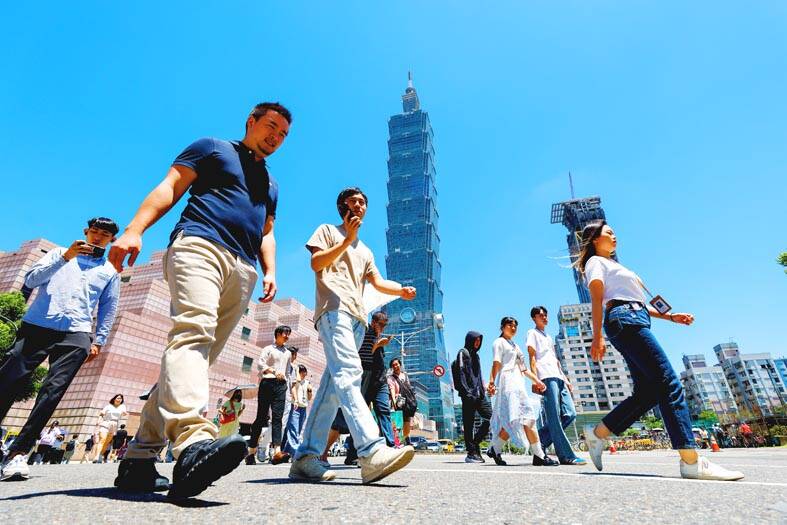Taiwan ranked 10th globally in the World Digital Competitiveness Ranking released yesterday by the Switzerland-based International Institute for Management Development (IMD).
The ranking assessed 69 economies on their ability to adapt to, explore and benefit from digital transformation, based on three key factors — “knowledge,” “technology” and “future readiness” — comprising nine subfactors and 61 ranked criteria.
Among the three key factors, Taiwan performed best in future readiness, rising three places to third globally, while it was 11th in technology (down four places) and 16th in knowledge (up three places).

Photo: Ritchie B. Tongo, EPA
Taiwan ranked first globally in the “IT and media stock market capitalization” ranked criteria within the technology factor.
It was second in the “total R&D [research and development] personnel per capita” criteria and “total expenditure on R&D” as a percentage of GDP criteria, both in the knowledge factor, and was also second in “agility of companies” (future readiness).
Taiwan was third in “higher education attainment” and “educational assessment PISA-math,” both in the knowledge factor.
PISA is the OECD’s Programme for International Student Assessment.
It was also third in “opportunities and threats” in business agility and “use of big data analytics,” both in the future readiness factor.
In Taipei, the Ministry of Digital Affairs said the results show that Taiwan has a solid foundation for the development of the artificial intelligence (AI) industry and the nation’s digital transformation.
Taiwan’s progress in future readiness reflects the competitiveness of local enterprises, as well as the government’s achievements in public-private collaboration and data privacy protection, the ministry said.
It would continue to work with other agencies to refine laws and issue guidelines to improve AI governance, and raise Taiwan’s international visibility in digital policy and innovation, it said.
Switzerland (first), the US (second) and Singapore (third) were the top three digitally savvy nations, the IMD report said.

Three Taiwanese airlines have prohibited passengers from packing Bluetooth earbuds and their charger cases in checked luggage. EVA Air and Uni Air said that Bluetooth earbuds and charger cases are categorized as portable electronic devices, which should be switched off if they are placed in checked luggage based on international aviation safety regulations. They must not be in standby or sleep mode. However, as charging would continue when earbuds are placed in the charger cases, which would contravene international aviation regulations, their cases must be carried as hand luggage, they said. Tigerair Taiwan said that earbud charger cases are equipped

Foreign travelers entering Taiwan on a short layover via Taiwan Taoyuan International Airport are receiving NT$600 gift vouchers from yesterday, the Tourism Administration said, adding that it hopes the incentive would boost tourism consumption at the airport. The program, which allows travelers holding non-Taiwan passports who enter the country during a layover of up to 24 hours to claim a voucher, aims to promote attractions at the airport, the agency said in a statement on Friday. To participate, travelers must sign up on the campaign Web site, the agency said. They can then present their passport and boarding pass for their connecting international

WEATHER Typhoon forming: CWA A tropical depression is expected to form into a typhoon as early as today, the Central Weather Administration (CWA) said yesterday, adding that the storm’s path remains uncertain. Before the weekend, it would move toward the Philippines, the agency said. Some time around Monday next week, it might reach a turning point, either veering north toward waters east of Taiwan or continuing westward across the Philippines, the CWA said. Meanwhile, the eye of Typhoon Kalmaegi was 1,310km south-southeast of Oluanpi (鵝鑾鼻), Taiwan’s southernmost point, as of 2am yesterday, it said. The storm is forecast to move through central

The age requirement for commercial pilots and airline transport pilots is to be lowered by two years, to 18 and 21 years respectively, to expand the pool of pilots in accordance with international standards, the Ministry of Transportation and Communications announced today. The changes are part of amendments to articles 93, 119 and 121 of the Regulations Governing Licenses and Ratings for Airmen (航空人員檢定給證管理規則). The amendments take into account age requirements for aviation personnel certification in the Convention on International Civil Aviation and EU’s aviation safety regulations, as well as the practical needs of managing aviation personnel licensing, the ministry said. The ministry